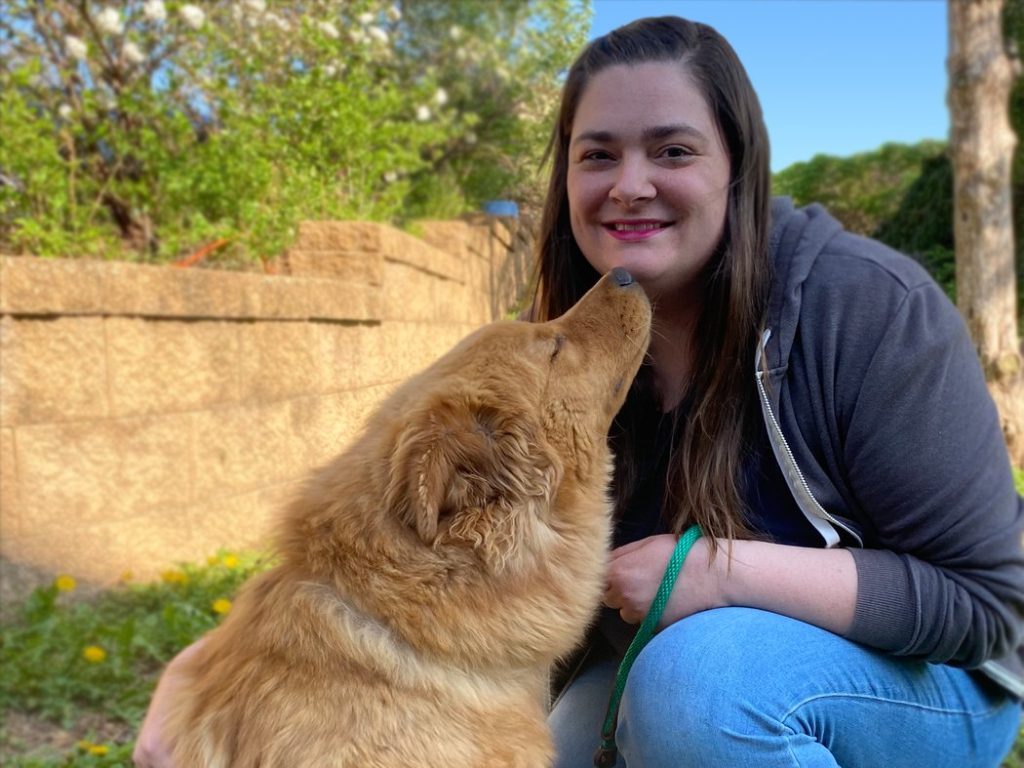
Animal expert, Ashley Flores, CPDT-KA, is the Senior Director of Animal Behavior, Foster & Rescue. Ashley studied under the Council of Certified Professional Pet Dog Trainers (CCPDT), is CPDT-KA certified and American Kennel Club Canine Good Citizen (CGC) certified. She also earned certification for Behavior Pharmacology and Separation Anxiety through Heartland Positive Dog Training Alliance (HPDTA) Training. Email askashley@greatplainsspca.org for a chance to have your pet question answered in KC Parent Magazine.
How Do I Teach My Puppy To Poop Outside?
We have a four-month-old rat terrier mix that we got when she was seven weeks old. She’s been more difficult to potty-train than any other puppy we’ve ever had. We use a crate and limit her with baby gates to half of our first floor, which has hardwoods. We want to allow her upstairs to the bedroom with us, but she thinks it’s okay to go #2 on the carpet (and any rugs we put down on the hardwoods.) Otherwise, she keeps her crate spotless; she pees outside; and rarely poops on the hardwoods. Without scolding her, how do we retrain her that our carpet is not grass? (She’s not being sneaky; she goes on the carpet right in front of us.) – Tracy
I recommend restarting the potty-training process all over and not letting her free roam unsupervised until she has gone 16 weeks without an accident. That may seem excessive, but that is when you know your pet is truly housetrained. It’s common for people to give freedoms early when training but that often causes delays in the process. Do not allow her on the carpet or rug without being supervised. Watch for eliminating signs such as sniffing and circling and redirect her by taking her outside. Something that has helped many of my clients is to keep the dog tethered by a leash to your belt so she stays with you when walking through the house. When she starts showing signs of needing to go, take her out immediately and reward her for going potty in the appropriate place. A restart with crating, gating like you mentioned, and supervised free roaming will help tremendously. It’s also a good reminder to know that she’s still a puppy at this age and all animals learn at different paces. She may just be a late bloomer, so repeating the training is key. – Ashley Flores, CPDT-KA
Constantly Barking At People… What Do I Do?
I have two ten-year-old schnauzers. They bark at people and dog walkers excessively. I’ve tried everything to get them to stop with no luck. What do you think of squirting them with water? Or other suggestions. Thanks – JB
It will be a difficult habit to curb if they have been doing it for 10 years, but still correctable. I recommend training them individually. Often people want to train multiple dogs together but that hinders the process because dogs feed off the other’s inappropriate behavior and cause them to become more reactive. When you’re at home and inside, get a mat and teach the command, “Go to the Mat” when people walk by. Reward the dogs for quiet and calm behaviors. If you’re on a walk, work on desensitizing them to unfamiliar people and pets. Regarding your question about squirting them with water, it is not a good long-term training strategy because it usually causes reactive dogs to become frustrated, and the behaviors can exacerbate. Dogs are associative learners, which means they learn in patterns. If you can create a new pattern and reward the behavior, they will be more apt to repeat the pattern if you are using it consistently. So, what does that mean exactly? If your dog barks when someone walks by in your home, predict the behavior, lure them to the mat and reward when they get there. I also recommend training the “Leave It” command and using that for anything they are reactive to. – Ashley Flores, CPDT-KA
Email askashley@greatplainsspca.org for a chance to have your pet question answered in KC Parent Magazine! For anyone interested in a Behavior Class or Consultation, our expert Behavior Team can work with you to help resolve any behavioral challenges you are experiencing with your pet. CLICK HERE for more information and registration.

